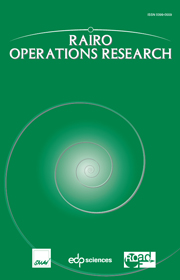Article contents
About the choice of the variable to unassign in a decision repair algorithm
Published online by Cambridge University Press: 15 July 2005
Abstract
The decision repair algorithm (Jussien and Lhomme, Artificial Intelligence139 (2002) 21–45),which has been designed to solve constraint satisfaction problems (CSP), canbe seen, either (i) as an extension of the classical depth first treesearch algorithm with the introduction of a free choice of the variable towhich to backtrack in case of inconsistency, or (ii) as a localsearch algorithm in the space of the partial consistent variableassignments. or (iii) as a hybridisation between local searchand constraint propagation. Experiments reported in Pralet and Verfailllie (2004) show that some heuristics for the choice of thevariable to which to backtrack behave well on consistent instances andthat other heuristics behave well on inconsistent ones. They show alsothat, despite its a priori incompleteness, decision repair,equipped with some specific heuristics, can solve within a limited timealmost all the consistent and inconsistent randomly generatedinstances over the whole constrainedness spectrum. In this paper, wediscuss the heuristics that could be used by decisionrepair to solve consistent instances, on the one hand, andinconsistent ones, on the other hand. Moreover, we establish thatsome specific heuristics make decision repair complete.
Keywords
- Type
- Research Article
- Information
- Copyright
- © EDP Sciences, 2005
References
- 1
- Cited by


